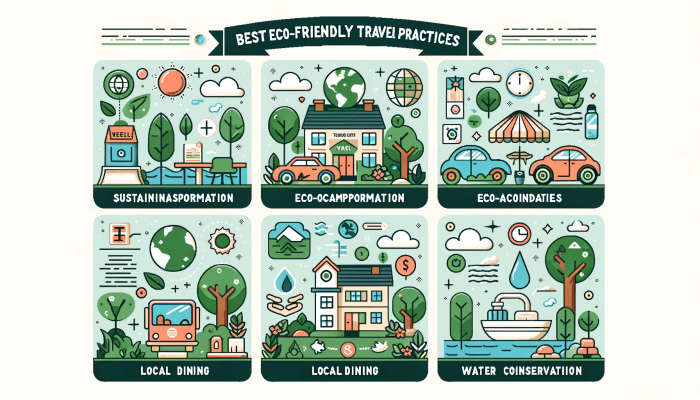In a world where the beauty of our planet is increasingly under threat, the way we travel can play a pivotal role in preserving it. Traveling, while an enriching experience, often leaves a carbon footprint that impacts our environment.
With my extensive experience around “Best eco-friendly travel practices“, I’m here to guide you through sustainable and responsible travel methods that not only ensure unforgettable experiences but also ensure we leave a minimal impact on the places we visit. Let’s embark on this green journey!
1. Sustainable Transportation Choices
Transportation is one of the biggest contributors to carbon emissions. Opting for direct flights, traveling by train where possible, or using public transportation can drastically reduce your carbon footprint.
When exploring a city, consider walking, cycling, or using electric scooters. Not only are these eco-friendly, but they also offer a closer look at the destination’s culture and daily life.
If driving is essential, consider renting a hybrid or electric vehicle. Carpooling or sharing rides can also be a more sustainable choice.
2. Eco-friendly Accommodations

Many hotels and accommodations are now adopting eco-friendly practices. Look for accommodations with green certifications or those that practice water conservation, energy efficiency, and waste reduction.
Consider staying in locally-owned lodges or homestays. These often have a smaller environmental footprint and contribute directly to the local economy.
When staying in a hotel, simple acts like reusing towels, turning off lights, and avoiding single-use plastics can make a significant difference.
3. Respect for Local Ecosystems
When traveling, especially to ecologically sensitive areas, it’s essential to be aware of the local flora and fauna. Avoid touching or disturbing wildlife and maintain a safe distance.
Stay on designated paths and trails to prevent soil erosion and damage to native plants. Avoid picking plants or flowers and refrain from feeding wildlife, as it can disrupt their natural behavior and diet.
When snorkeling or diving, avoid touching coral reefs and use eco-friendly sunscreens that don’t harm marine life.
4. Waste Management
Waste, especially plastic waste, is a significant concern worldwide. Carrying a reusable water bottle, using cloth bags, and avoiding single-use plastics can reduce the waste you generate while traveling.
Dispose of waste responsibly, using recycling bins where available. If you’re in a remote area, consider carrying your trash with you until you find a suitable disposal facility.
Support clean-up initiatives. Many tourist destinations organize beach clean-ups or community clean-up events. Participating in these can make your trip more meaningful.
5. Sustainable Dining
Food is an integral part of travel. Opting for local, organic, and seasonal produce reduces the carbon footprint associated with transporting food items.
Support local restaurants and eateries, which often use fresh, local ingredients. This not only offers an authentic taste of the destination but also supports the local economy.
Reduce food waste by ordering portions you can finish, and consider carrying your own reusable cutlery and containers for takeaways.
6. Eco-friendly Activities
A. Adventure Sports
When participating in adventure sports, ensure you choose operators that follow sustainable practices. Whether it’s trekking, rafting, or zip-lining, ensuring minimal environmental impact is crucial.
Carry eco-friendly gear, avoid littering, and respect local guidelines to maintain the area’s natural beauty for future visitors.
B. Cultural Tours
Immersing yourself in local culture is enriching. When visiting cultural sites or participating in local festivals, be respectful, dress appropriately, and always ask for permission before taking photographs.
Supporting local artisans by purchasing handcrafted souvenirs can contribute to the community’s economic well-being and offer you a lasting memory of your trip.
7. Water Conservation

Water is a precious resource, and its conservation is crucial. Use water judiciously, take shorter showers, and avoid leaving taps running unnecessarily.
If you’re in a region facing water scarcity, be extra cautious with your water usage. Carrying a portable water purifier can reduce your reliance on bottled water.
Avoid activities that waste water, such as jet skiing or recreational fishing, in areas where water conservation is a concern.
8. Carbon Offsetting
Even with the best eco-friendly travel practices, it’s challenging to have a completely carbon-neutral trip. Carbon offsetting is a way to compensate for your travel emissions by investing in environmental projects.
Many airlines and travel companies offer carbon offset programs, allowing you to invest in renewable energy, reforestation, or other eco-projects.
While it’s not a direct solution, carbon offsetting is a step towards making your travels more sustainable.
9. Educate and Advocate

Being an eco-friendly traveler is not just about following best practices but also about educating others. Share your knowledge with fellow travelers, encouraging them to adopt green travel habits.
Support and advocate for sustainable tourism practices, both at home and abroad. Collaborate with local communities and organizations to promote eco-friendly initiatives.
Remember, every small action counts. The collective efforts of travelers worldwide can lead to a more sustainable and eco-friendly travel industry.
FAQs on Best Eco-friendly Travel Practices
1. Why is eco-friendly travel important?
2. How can I reduce my carbon footprint while traveling?
3. What should I consider when choosing accommodations?
4. How do I ensure I’m not harming local ecosystems?
5. Can I engage in adventure sports and still be eco-friendly?
6. What are the best ways to support local communities while traveling?
Conclusion
The essence of travel lies in discovery, not just of places but of practices that make the world a better place. “Best eco-friendly travel practices” aren’t just guidelines; they’re a commitment to the planet and its diverse cultures. As you quench your thirst for adventure, remember to tread lightly and responsibly. For more insights into sustainable travel and beyond, dive into our treasure trove of articles.
For a deeper dive into sustainable adventures, don’t miss our comprehensive guide on 9 Ultimate Guide to the Essential Travel Packing Checklist. Journey responsibly!